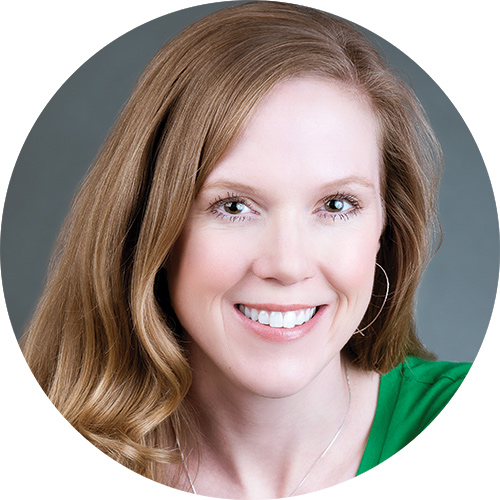Lessons Learned about Mental Health
I worried about grades as a teenager. I mean, I really worried.
Today, I know this was not typical anxiety about school. Looking back, I struggled with obsessive-compulsive disorder and perfectionism. Among other things, I was obsessive-compulsive about never wasting time. Not. One. Second. Further, I was laser-focused on getting nothing but 100 percent of the answers right on everything.
I remember audio recording myself reading my textbooks aloud. Then, when doing “unproductive” things like walking to class or driving to the store, I could listen to my textbook recordings. OCD wouldn’t allow me to talk with friends on the way to class or to listen to music in my car, as these activities were deemed a waste of time.
My roommates in college were flabbergasted by this and my other behaviors. You’re studying, yet again, on a Saturday night?
 I wish I had known that this level of anxiety, as well as isolation, was a problem.
I wish I had known that this level of anxiety, as well as isolation, was a problem.
Little did I know, in the end, my grades weren’t going to matter that much. If I could get all of that over-studying time back, I would put it toward what truly counts in life, like meaningful relationships. I’m not saying that learning isn’t important. Memorizing my textbooks word for word wasn’t necessary or productive. In fact, I barely retained anything that I learned from semester to semester. Part of the reason for this memory loss has to do with my next lesson learned.
I wish I had known that my relationship with food and my body wasn’t normal.
I should have been diagnosed with anorexia nervosa in college, but most people were too busy giving me compliments to notice that I was suffering from the mental illness with the highest mortality rate of any other. You look great. How do you stay so thin? However, my parents were worried, so I visited my college doctor who asked one so-called diagnostic question, “Do you eat?”
Yes, I ate, and the ironic thing about my eating disorder is that it wasn’t truly about food, shape, or weight. Instead, anorexia was, in part, about that painful, unrelenting perfectionism. Restricting and bingeing helped, in the short term, to turn down the knob on anxiety, not to mention, to mask my underlying depression.
I was malnourished. My brain wasn’t working. Back to my earlier point, this, in addition to the fact that OCD and perfectionism didn’t find sleep productive, is why I didn’t retain that information that I’d worked so hard to memorize.
I cannot fathom how I got by on so little sleep.
I won’t mention a specific number of hours here, because I don’t want to be triggering. When I speak at colleges, I have learned that today, there is an even more rampant race to see who can sleep the least. Yet, research tells us that getting enough sleep is required for optimal learning and health. I didn’t know that back then.
Something else that I wish my friends and I had understood is the prevalence of sexual violence on college campuses.
April is Sexual Assault Awareness Month. Sexual violence can lead to posttraumatic stress disorder (PTSD), substance use disorder, depression, and other trauma-related problems. What I know now: if you have to ask yourself whether sex was consensual, it wasn’t. By definition, the idea of consent means that you would know.
This is a message many of my friends and I desperately needed to hear. If I had, when I experienced sexual assault with a boyfriend in my late twenties, I might have known to call it what it was. I believe that we should take the “date” off “date rape” because it seems to minimize the assault. I’d later develop PTSD as a result.
I will be talking more about PTSD and all of these topics on this blog in the months to come, as I am honored and excited to be the newest Senior Fellow of Meadows Behavioral Healthcare! As it turns out, joining this incredible team had nothing to do with my near perfect college transcript and everything to do with how mental illness has knocked me down over and over again, and, importantly, with the support of professionals and loved ones, I have learned how to stand back up again, each time.
Gratefully, I no longer struggle with OCD, nor PTSD. I have tools to deal with anxiety, ones that don’t involve dieting, nor bingeing. Getting plenty of sleep helps. I have even learned to embrace this perfectly imperfect—and what I now see as a wonderful—life.
Most of all, what I know now that I wish I could go back and tell my teenage self is:
You are not alone. Mental illness is real. You didn’t choose it, but you can choose to get better. Help is available, and above all, healing happens.

About Senior Fellow Jenni Schaefer
A Meadows Senior Fellow and advocate for its specialty eating disorders program, The Meadows Ranch, Jenni Schaefer is the bestselling author of Life Without Ed, Almost Anorexic, and Goodbye Ed, Hello Me. Her next release, Facing the Invisible Monster: How I Came Back from Trauma and How You Can Too, is scheduled for a January 2022 release.
Schaefer graduated summa cum laude from Texas A&M University with a degree in biochemistry, and she knows firsthand the devastating consequences of an eating disorder. Since recovering from her own eating disorder, she has carried her message of self-acceptance and triumph over adversity to the public. A sought-after speaker on addiction and food disorders, relationships, depression, and career, Jenni has appeared on Dr. Phil, Dr. Oz, the TODAY show and Entertainment Tonight, as well as in print coverage from Cosmopolitan and The New York Times.
For more information, visit JenniSchaefer.com.

